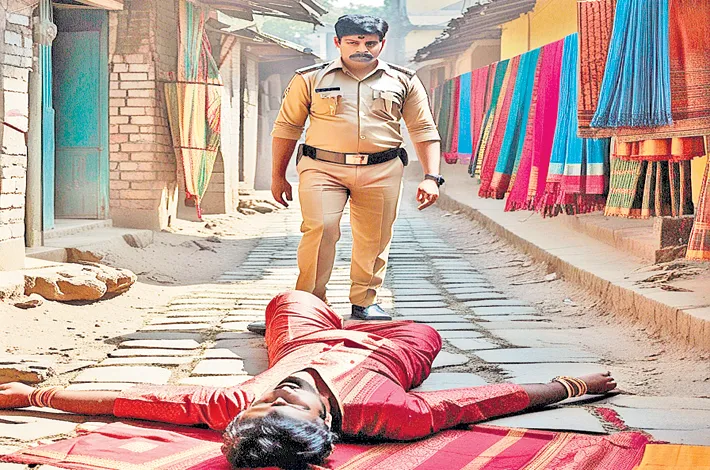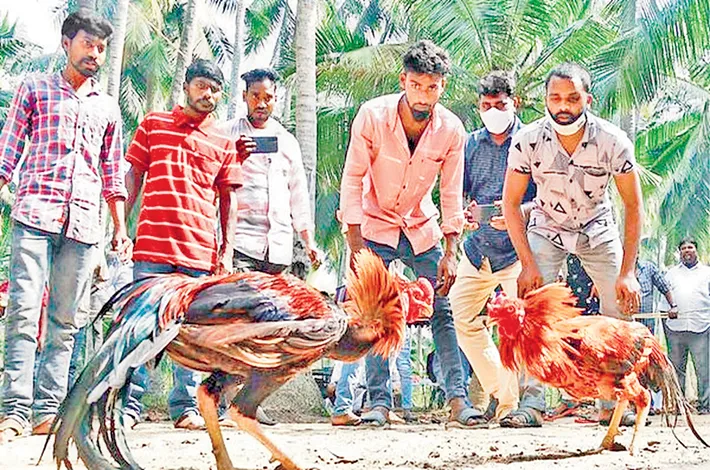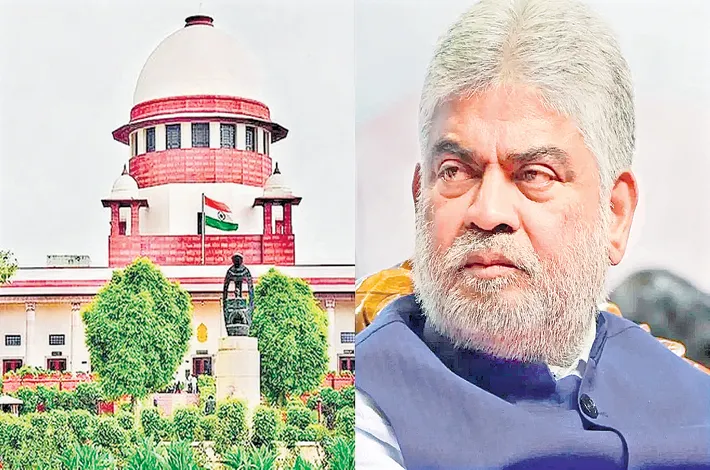The Shadows of Narayanpet
29-05-2025 12:00:00 AM

The air in Narayanpet was thick with the scent of rain-soaked earth and the faint tang of turmeric from the bustling market. The small Telangana town, known for its handwoven sarees, hummed with life during the day, but as dusk settled, its narrow lanes turned eerily silent.
It was in this quiet, under the flicker of a lone streetlamp, that Inspector Arjun Reddy found himself staring at a body sprawled across the cobblestones of an alley near the old weaver’s colony.
The victim was Vikram Naidu, a wealthy saree merchant whose opulent lifestyle had made him both admired and despised. His throat was slit with surgical precision, and his gold watch glinted mockingly under the dim light. Arjun crouched beside the body, his sharp eyes scanning for clues. The cut was clean, no signs of struggle. This wasn’t a robbery gone wrong—it was deliberate, personal.
Narayanpet wasn’t known for violent crime. Its people were weavers, traders, and farmers, their lives woven into the rhythm of looms and harvests. But Arjun, a native who’d returned after years in Hyderabad’s crime branch, knew that even small towns harbored dark secrets. He’d been posted here six months ago, and already, he sensed undercurrents of envy and greed beneath the town’s serene facade.
“Sir, no witnesses yet,” said Constable Lakshmi, her flashlight sweeping the alley. “The shopkeepers nearby claim they heard nothing.”
Arjun nodded, his jaw tight. “Get the body to the morgue. I want forensics to check for prints, fibers, anything. And pull Vikram’s financial records. Someone this rich doesn’t die without a reason.”
By morning, the town was abuzz with whispers. Vikram’s murder was the talk of the chai stalls and saree shops. Arjun began his investigation at Vikram’s sprawling mansion on the outskirts of town, a gaudy structure that stood out against Narayanpet’s modest skyline. Inside, he met Shalini, Vikram’s young widow, her eyes red but her composure unshaken.
“He had enemies,” Shalini said, her voice steady as she poured tea. “Business rivals, mostly. Vikram was ruthless when it came to deals. He’d undercut anyone to secure a contract.”
“Anyone specific?” Arjun asked, noting her calm demeanor. Grief, he knew, could mask guilt.
“Ramesh Goud,” she replied, her gaze flickering. “He owns half the looms in town. Vikram outbid him for a government contract last month. Ramesh didn’t take it well.”
Arjun’s next stop was Ramesh’s warehouse, a cavernous space filled with the rhythmic clack of looms. Ramesh, a burly man with a permanent scowl, didn’t bother hiding his disdain for Vikram. “He was a snake,” Ramesh spat, wiping sweat from his brow. “Cheated me out of lakhs. But kill him? I’m not that stupid.”
Arjun pressed him, but Ramesh’s alibi was solid—multiple workers confirmed he was at the warehouse until midnight. Still, something about Ramesh’s anger felt too raw, too rehearsed. Arjun left with a nagging suspicion but no evidence.
Back at the station, the forensic report offered a breakthrough: a single strand of silk, vibrant red, found clutched in Vikram’s hand. It wasn’t from his clothing or anything at the scene. Narayanpet’s silk was distinctive, each weaver’s pattern unique. Arjun sent the strand to a local expert, who traced it to a small, family-run loom owned by a weaver named Anjali.
Anjali’s home was a modest shack on the edge of town, its walls adorned with colorful sarees. She was a slight woman, her hands calloused from years at the loom. When Arjun showed her the silk strand, her face paled. “That’s mine,” she admitted, her voice trembling. “But I swear, I didn’t kill him.”
Anjali’s story tumbled out. Vikram had been pressuring her family to sell their loom to him at a fraction of its worth. When they refused, he’d spread rumors that their sarees were defective, crippling their business. “He ruined us,” she whispered, tears welling. “But I wasn’t in the alley that night.”
Her son, Kiran, a lanky teenager, hovered nearby, his eyes darting nervously. Arjun noticed a fresh cut on Kiran’s hand, hastily bandaged. “Where were you last night, Kiran?” he asked.
“At home,” Kiran mumbled, avoiding eye contact.
Arjun didn’t buy it. He requested a search of Anjali’s home. In Kiran’s room, they found a knife hidden under a floorboard, its blade stained with dried blood. Kiran bolted when confronted, but Lakshmi tackled him in the yard. Under interrogation, the boy broke down.
“I didn’t mean to kill him,” Kiran sobbed. “He came to our house that night, threatening Ma again. I followed him to the alley, just to scare him. But he laughed, said we’d lose everything. I lost it… I just swung the knife.”
Arjun felt a pang of pity but cuffed Kiran. The case seemed closed, yet something gnawed at him. Kiran’s story was plausible, but the precision of the cut didn’t match an impulsive act by a teenager. He revisited the crime scene that night, the alley now cordoned off. Under the streetlamp’s glow, he noticed something he’d missed: a faint imprint in the mud, the heel of a woman’s sandal.
Back at the station, Arjun reviewed Shalini’s statement. She’d claimed to be home all night, but no one could corroborate it. He confronted her at the mansion, presenting the sandal imprint. Shalini’s composure cracked. “You can’t prove anything,” she snapped.
But Arjun had one last card. The forensics team had found a second, fainter blood trace on the knife—Vikram’s, but older, suggesting the blade had been used before Kiran’s attack. Shalini’s fingerprints were on the handle, buried under Kiran’s. Faced with the evidence, Shalini confessed.
“I hated him,” she said, her voice cold. “Vikram was bleeding me dry, controlling every rupee. I wanted out. I followed him to the alley, stabbed him, but he didn’t die. Kiran must’ve finished it.”
Shalini had manipulated Kiran’s rage, knowing he’d take the fall. Arjun arrested her, his heart heavy. Narayanpet’s looms would keep weaving, its secrets buried in silk, but justice, at least, had unraveled the truth.








